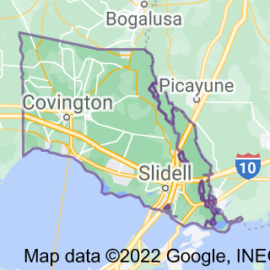
Attorney General Landry will sign off on a major settlement with Freeport McMoRan Inc.
A potentially ground-breaking settlement with a major oil and gas company to help restore Louisiana’s disappearing coast will take a big step forward Thursday when Attorney General Jeff Landry publicly authorizes the agreement, said sources familiar with the deal. The proposed $100 million settlement with Freeport McMoRan Inc. requires the signature of both Landry, a Republican, and Thomas Harris, the secretary of the Department of Natural Resources, representing Gov. John Bel Edwards, a Democrat. Harris has already signed it.
nola.com
John Carmouche, a Baton Rouge attorney, negotiated the agreement and feels it will be a blueprint for future settlements.
John Carmouche, the Baton Rouge attorney who negotiated the deal on behalf of parish governments, believes the Freeport settlement will become a blueprint for agreements with other oil and gas companies that would end lawsuits against them by parishes and the state. In return, the companies would deliver billions of dollars for coastal restoration over perhaps two decades. In all, the Carmouche law firm has accused Freeport and 41 other oil and gas companies of destroying coastal wetlands and marshes through their drilling and exploration activities. “This is real, and it’s a big deal,” Carmouche said on Wednesday about Landry’s move. “It’s also an important day when this big deal can be done in a nonpartisan way and respect the economy, energy companies and the environment all at the same time.”
The Attorney General, generally supports the oil and chemical industries so this is a bit of a surprise that he will sign the agreement.
Landry, generally an energy industry ally, is holding a press conference Thursday morning to explain why he is signing the deal, given that oil and gas companies have strongly opposed such settlements. Last year, oil and gas companies sought to have the state Legislature kill the lawsuits filed by the Carmouche law firm. That effort failed, but the bill’s main sponsor, state Sen. Mike Fesi, R-Houma, vowed immediately afterward to try again this year.
Even though this agreement will be signed, it covers only one parish and twelve parishes have a say in the settlement as well.
The first is that 12 coastal parishes must all agree to it. Freeport faces potential legal liability in those parishes. Those that have signed the agreement so far are Plaquemines, St. Bernard, Jefferson, St. John, Vermilion, Cameron and St. Charles, according to Carmouche. The first is that 12 coastal parishes must all agree to it. Freeport faces potential legal liability in those parishes. Those that have signed the agreement so far are Plaquemines, St. Bernard, Jefferson, St. John, Vermilion, Cameron and St. Charles, according to Carmouche. Terrebonne is the eighth one, according to Charles Bourque, a private attorney in Houma who is representing the district attorney there, Joseph Waitz Jr. That signature is in dispute, however, because Gordon Dove, the Terrebonne Parish president, believes that he, not Waitz, has decision-making authority over the settlement. “I have not seen it,” Dove said Wednesday. A ninth parish is Lafourche. Its parish council is meeting in executive session on Tuesday to discuss the proposed settlement, said Jerald Block, a private attorney in Thibodaux who is representing the parish council on coastal issues. The final three parishes are St. Mary, Iberia and St. Martin, and they all have the same district attorney, Bofill Duhe. He did not return a phone call or text Wednesday; nor did Gladstone Jones, a private attorney in New Orleans who is representing Duhe in the matter.
The legislature also has to approve this settlement and this is Louisiana. However the blessing by Landry might make passage possible. THe settlement benefits both the company and the state.
Under the proposed deal, which Carmouche has not yet made public, Freeport would no longer face legal liabilities for its past drilling and exploration activities in Louisiana. In exchange, the company would pay up to $100 million in cash and in what Carmouche calls “environmental credits.” The company would make those payments over 20 years, beginning with a $15 million upfront payment. The 12 parishes would divide $23.5 million in cash and up to $76.5 million generated by selling environmental credits to other companies looking for environmental offsets for projects.
Since the state has lost more than a Rhode Island size piece ofour coast land and if this helps recover some of it it will be a good deal for the state, especially those living in the threatened areas.



